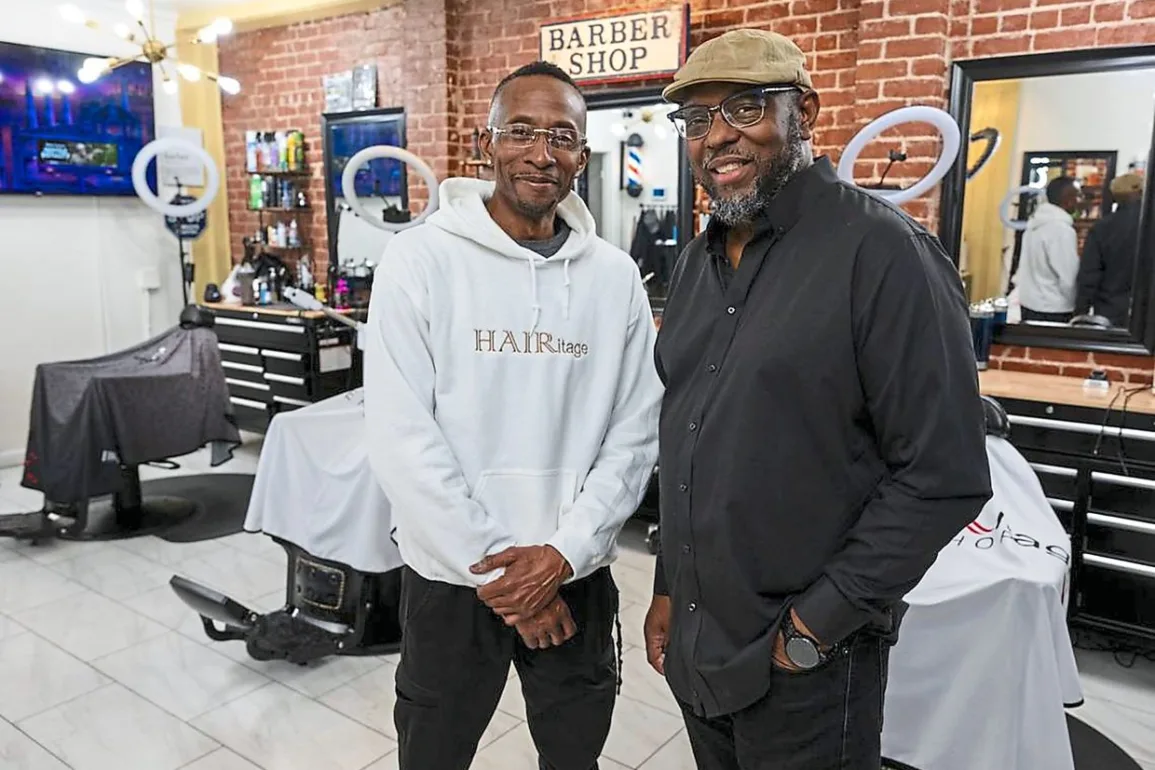Brothers Marichal and Rodney Brown follow in their father’s footsteps at their HAIRitage barbershop on Sacramento’s Broadway in California, the United States.
Earlie D. Brown was a certified master barber in their Bay Area hometown who counted San Francisco Giants’ players among his clientele – he even named son Marichal for family hero and Giants’ Hall of Fame pitcher Juan Marichal.
But their father’s shop was much more than a haircut and a shave. It was also a sanctuary with Earlie, known as a trusted ear. His shop featured a back room where he would sit with customers who wanted a more private conversation.
“We as Black men, we’re taught not to show emotions,” Marichal said. “But, as Black men, we can talk to others who understand.”
Today, the Browns and their Sacramento shop are part of a growing national network of Black barbers and stylists who have become front-line mental health advocates in their communities as members of the Confess Project of America barber coalition.
The project capitalises on the centrality of the barbershop in the lives of Black men and youth by becoming a conduit for care. The project is the brainchild of Lorenzo Lewis, the Atlanta-based behavioural health professional who founded Confess in 2016.
The project’s vision: “I am more than a pair of clippers; I am improving my community through the barber chair one client at a time.”
The Confess Project to date has trained more than 4,000 barbers and stylists in 54 cities across the country since its inception.
Barbers must be licensed, have access to social media and be willing to receive mental health training to become part of the coalition.
“Cultural biases have caused so many problems – misdiagnoses in treatment, lack of understanding. It’s important to advocate for ourselves,” said Darnell Rice, one of the trainers who joined Lewis in Sacramento in February on the first stop of a multi-city tour for the Confess Project’s “Beyond the Shop” programme.
The programme extends Confess’ mission by training and helping Black hair care and other workers to help be mental health advocates for Black men, boys and their families, connecting them with mental health services and helping to close the gap of mental health access and care.
In Sacramento, Confess barbers and stylists work with Turning Point Community Programs.
“We see people at their highest and at their lowest. They reveal everything that goes on with them,” Marichal said.
Since joining, he said he’s helped customers with referrals to clinicians and has helped more than a dozen in the programme.
Ending a stigma
The August California Health Care Foundation study, “Listening to Black Californians with Mental Health Conditions”, showed how personal mental health struggles are for many Black Californians.
Nearly one in four reported a mental health condition. Three in 10 Black women who responded reported mental health conditions, while about 20% of Black men reported a mental health condition.
But many more Black men fail to report their symptoms, reticent to talk about what they’re going through in their lives even as discussing mental health is shedding its taboo in the Black community.
Even when Black Californians seek out care, many leave the doctor feeling ignored, disrespected, disbelieved or blamed for what they were experiencing, the study showed.
Four in 10 with mental health conditions say they avoided care because they felt they would not be treated fairly or with respect and devised strategies to lessen poor treatment.
More troubling, suicide has become the third leading cause of death for Black male teens and young adults, according to the Centers for Disease Control and Prevention. Black men and boys account for more than 80% of suicides among Black Americans, according to the CDC, while rates of death by suicide among Black men have increased 25% in the past two decades.
Starting the conversations that stem that tide can begin in the barber’s chair, Lewis said.
“This is rooted in building community-based advocates” who can become active listeners, help to reduce the stigma in the Black community around discussing mental health and to navigate generational trauma, Lewis said.
“When the conversation is about advocates, you’re talking about real people who help these people navigate their (problems),” he continued.
“This model is how we’re going to get out in front of the curve.”
The barbershop was formative for Rice growing up and, he said, remains an important refuge for Black men and youth navigating their own struggles.
“The barbershop is somewhere we can grow, where we can understand (how) to be men, to be ourselves – to authentically be ourselves; to not be judged, to open up and have those conversations with our barbers because we know how pivotal the barbershops and salons in our communities have been,” Rice said.
“For me, the barbershop has helped me become a better person, a better advocate and, most of all, a better man.” – The Sacramento Bee/Tribune News Service




